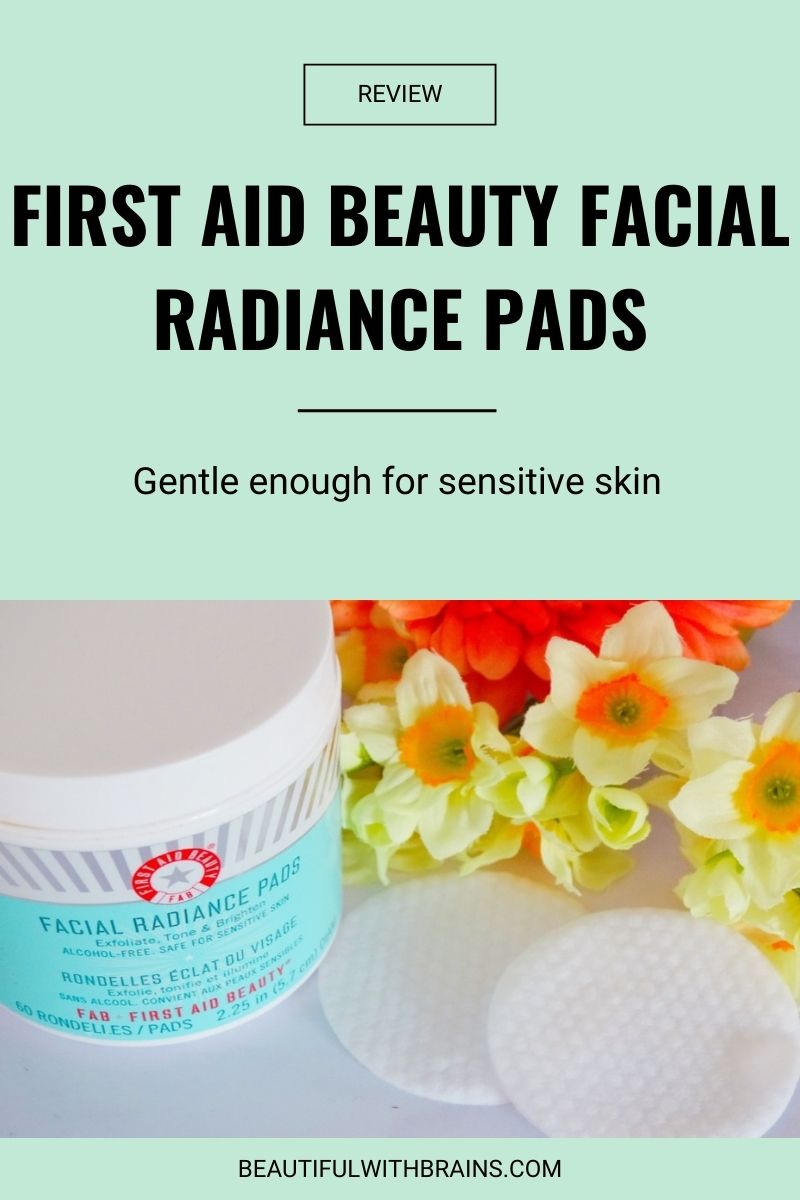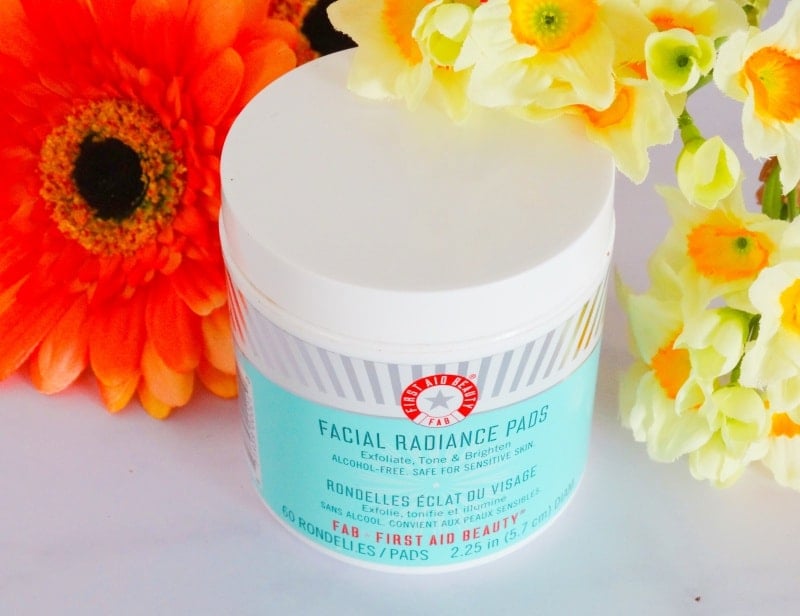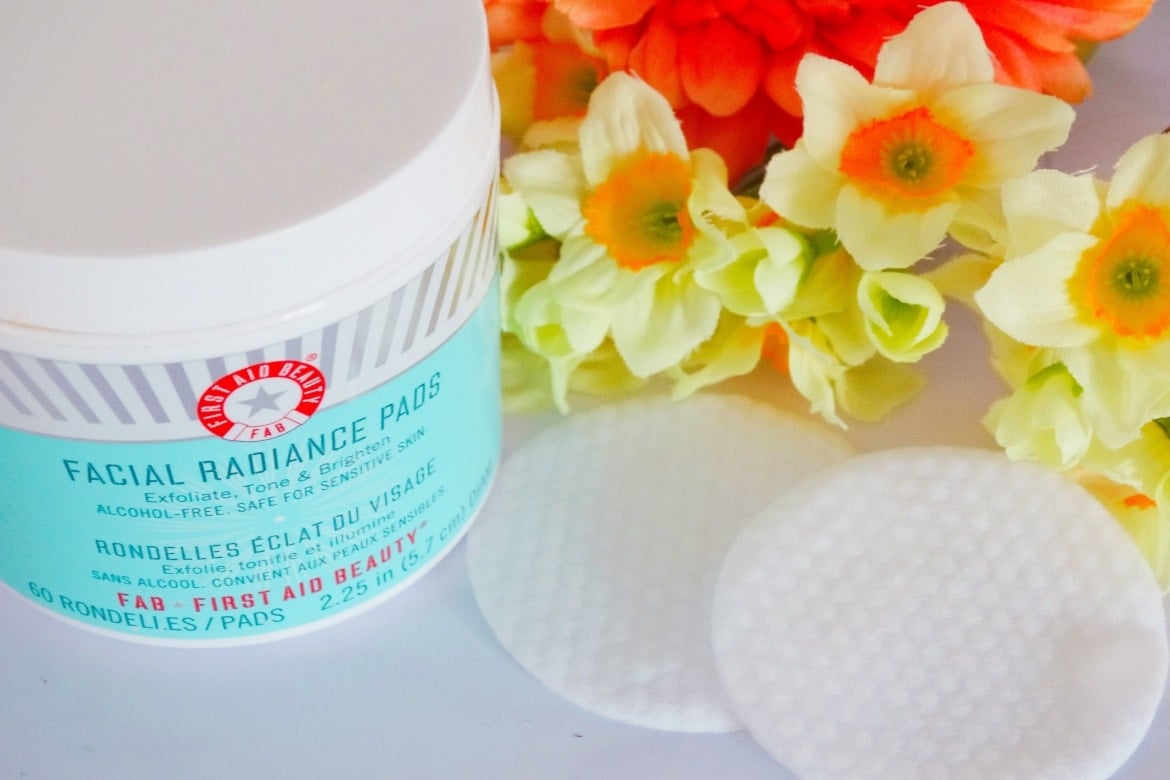
So, you want to jump on the glycolic acid bandwagon but all those horror stories of irritated, flaky skin are holding you back?
I hear ya. Go overboard and your skin will pay the price. Much better to tip your toes in the water (or skin in the acid, in this case) slowly. How?
First Aid Beauty Facial Radiance Pads are a good place to start. Here’s why:
What’s In First Aid Beauty Facial Radiance Pads?
GLYCOLIC ACID TO EXFOLIATE SKIN
Glycolic acid is the smallest member of the Alpha Hydroxy Acid family, a group of exfoliants that allows dead skin cells to slough off by dissolving the “glue” that holds them together.
Size matters here: it’s what allows glycolic acid to penetrate skin better than other acids… and makes it more irritating than them. Glycolic acid is usually what makes your skin sting really bad.
Not here. First Aid Beauty Facial Radiance Pads don’t sting (unless you have super, super, super sensitive skin). There’s enough glycolic acid here to exfoliate your skin BUT not enough to sting or boost collagen.
That’s why these pads are in beginner territory. You can always switch to something more heavy duty when your skin gets used to the acid.
Related: The Complete Guide To Glycolic Acid
LACTIC ACID TO EXFOLIATE SKIN TOO
Lactic is another member of the Alpha Hydroxy Acids family. It exfoliates skin just as well as glycolic acid but has a bigger molecular structure that makes it way less irritating. That’s why, out of all the acids, lactic is usually the top choice for sensitive skin.
While we’re on the subject, lactic acid also works as a humectant. That’s a fancy way of saying it attracts moisture from the air into the skin, keeping it hydrated.
Related: Glycolic Acid Vs Lactic Acid: What’s The Difference?
ALOE VERA & CUCUMBER EXTRACT
What do aloe vera and cucumber extract have in common? They both have soothing properties that calm down redness and irritations.
This matters because even the gentlest exfoliant can irritate skin if used too often or if your skin is on the super sensitive side.
Their addition means that even the few irritants in the formula (more on that in a minute) won’t be able to do much harm. 🙂
Related: 9 Soothing Ingredients That Reduce Irritations
MANDARIN & LEMON EXTRACT
Brands love to put citrusy extracts, like lemon and mandarin, in their products because they’re natural exfoliants. Don’t be fooled.
- These extracts are used in such tiny amounts, they won’t exfoliate anything.
- Citrusy extracts are among the most irritating ingredients used in skincare.
Sure, when you use only a drop, they won’t do that much harm. And we have soothing ingredients that reduce their irritating potential anyway.
For the vast majority of people, they’re not a concern – not in this tiny amounts anyway. But if you have super sensitive skin that reacts to everything, do a patch test first. Just in case.
Related: 7 Natural Ingredients That Can Exfoliate Skin
Struggling to put together a skincare routine that minimises wrinkles, prevents premature aging, and gives your complexion a youthful glow? Download your FREE “Best Anti-Aging Skincare Routine” to get started (it features product recommendations + right application order):
Texture
The material is soft and doesn’t scratch my skin and the exfoliating solution they’re imbued in is lightweight and fast-absorbing.
Fragrance
Fresh and citrusy.
How To Use It
Two or three nights a week, after cleansing. Don’t use on retinol nights.
Performance & Personal
First Aid Beauty Facial Radiance Pads are one of the gentlest exfoliants I’ve ever tried. They don’t sting.
First Aid Beauty say they’re so gentle, you can use them daily. I say, that depends. My skin is pretty resistant and can tolerate daily exfoliation with “harsher” exfoliants so I can indeed use them daily. But if you’re just starting out on your acids journey or have sensitive skin, start with twice a week and build up frequency gradually.
Although they’re gentler than the exfoliants I’m used to, these pads still do a great job at exfoliating skin. After every use, my skin is smoother and brighter.
Overall, I’m pretty impressed. I’d definitely recommend them to acid newbies. 🙂
Who Is This For?
- Dry skin
- Acid newbies
Who Is This NOT For?
- Oily and/or acne-prone skin (you need salicylic acid)
- Sensitive skin (I don’t recommend glycolic acid for you)
Related: How To Choose The Right Exfoliator For Your Skin Type
Packaging
I’m currently using the big version of First Aid Beauty Facial Radiance Pads. My box contains 60 pads, which is enough to last you for a couple of months – more if you don’t exfoliate daily.
But they also come in a smaller version with only 28 pads. I’m thinking of getting that one for travelling. The box is much smaller and easily fits into a carry-on bag or purse.
Does First Aid Beauty Facial Radiance Pads Live Up To Its Claims?
| CLAIM | TRUE? |
|---|---|
| A daily treatment pad that contains just the right amount of Lactic and Glycolic Acids to safely and effectively exfoliate, tone, and brighten all skin types, including sensitive. | It’s not suitable for daily use, but everything else is true. |
| Facial Radiance Pads are safe for daily use by all skin types—even sensitive. | Daily use is never safe for sensitive skin. |
| Regular use of these pads will smooth the skin’s texture—providing the perfect canvas for flawless makeup application. | True. |
Price & Availability
28 pads, $15.00/£14.00 and 60 pads, $30.00/£24.00 at Asos, Feel Unique and Sephora
Do You Need It?
If you’re looking for a gentle exfoliant for dry skin, this is a good option to consider.
Dupes & Alternatives
- Malin + Goetz Resurfacing Glycolic Pads ($52.00)
- Pixi Glow Tonic To-Go Pads ($18.00)
Ingredients
Water, Aloe Barbadensis Leaf Juice, Glycerin, Cucumis Sativus Fruit Extract, Lactic Acid, Glycolic Acid, Leuconostoc/Radish Root Ferment Filtrate, Chrysanthemum Parthenium Extract, Sodium Hydroxide, Polysorbate 20, Camellia Sinensis Leaf Extract, Glycyrrhiza Glabra Root Extract, Citrus Nobilis Fruit Extract, Citrus Limon Peel Extract, Hyaluronic Acid, Phyllanthus Emblica Fruit Extract, Edta, Tetrasodium Edta, Phenoxyethanol, Chlorphenesin



